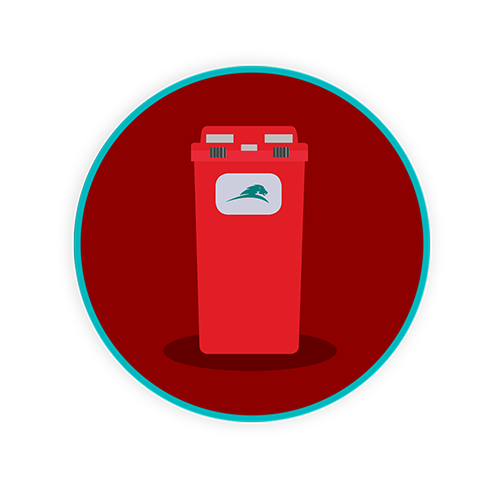Medical Waste Disposal in Ambulatory Care Facilities

Ambulatory care centers have become a critical and rapidly growing part of the healthcare system providing a wide range of outpatient care services. These services range from ambulatory surgery centers to urgent care clinics, and just as diverse as the care these facilities can provide are the types of waste they generate.
Waste disposal can be a particular challenge due to the smaller nature of these facilities and the difficulty in assigning dedicated staff to handle this task. Here we will take a look at the most common types of medical waste ambulatory care facilities generate and how they can handle them in a safe and environmentally conscious manner.
TOPICS WE WILL COVER:
1 / What Types of Waste Are Created in Ambulatory Care
2 / How Daniels Health Can Help
What Types of Waste Are Created in Ambulatory Care
Ambulatory care centers, by their nature, may generate a wide range of medical wastes, although typically in lower volumes than inpatient facilities. Despite lower volume, ambulatory care facilities must identify, segregate, and dispose of this waste properly to protect patients and staff. These facilities must follow the same standards when it comes to medical waste disposal as other medical facilities. Here is a closer look at the most common types of waste these facilities generate.
Regulated Medical Waste
Regulated medical waste (RMW) is a broad category that is legally defined by each state, but the Environmental Protection Agency’s (EPA) definition provides a good idea of just how large this category of waste is. According to the EPA, medical waste includes “any solid waste which is generated in the diagnosis, treatment, or immunization of human beings or animals.”
Obviously, ambulatory care facilities will generate a large quantity of waste that falls within this category, and though state regulations will vary in wording, they will generally include any materials that may have been contaminated with infectious agents. This includes blood or blood products, pathological waste, and contaminated sharps, among others.
In many cases – facilities need to identify RMW waste, segregate it into distinct waste streams, and dispose of them separately. The exact procedures will depend on the state regulations and the types of waste the ambulatory facility generates.
Sharps

Sharps are classified as regulated medical waste, but they deserve special mention because of the particular danger they pose and the special precautions facilities must take when disposing of them. Ambulatory care facilities will generally produce a significant volume of sharps such as needles, lancets, scalpels, and more when treating patients.
These waste items can carry infectious materials and, by their nature, pose a significant risk of injuries that can transmit potentially fatal infections and diseases. As a result, it is crucial for outpatient clinics to ensure they establish appropriate procedures for responsible handling of sharps waste and use leak and puncture-resistant containers.
Pharmaceutical Waste

Ambulatory care facilities often provide same-day surgical care, postoperative care management, or other outpatient care services that require pharmaceuticals. When these medications become expired or contaminated, these facilities must dispose of them in a safe and secure manner that mitigates the risk of theft or misappropriation.
The Drug Enforcement Administration (DEA) regulates the disposal process of certain pharmaceuticals through destruction and disposal requirements. If your facility violates these requirements, the DEA may assess significant penalties. The Resource Conservation and Recovery Act (RCRA) also provides rules and regulations. As a result, healthcare facilities must properly dispose of pharmaceuticals in a secure and compliant manner.
Chemotherapy Waste
Certain ambulatory care facilities will need to handle chemotherapy waste, which holds some of the strictest standards when it comes time for disposal. This waste – which is generated during the process of delivering chemotherapy to patients – is regulated by the EPA via RCRA, and the waste generated may be defined as “hazardous waste,” which must be disposed of through a strictly regulated process. However – this is not always the case, and it is crucial to understand the complex regulations governing this waste to avoid unnecessary costs and environmental damage.
How Daniels Health Can Help
Daniels Health is the industry leader with over 35 years of experience providing healthcare facilities with fully integrated healthcare waste management solutions. Daniels understands the complexity of the regulations governing every waste stream. Our partnership comes with expert guidance and education to guarantee safe and compliant waste management. This also includes standardized solutions for every waste stream – which means one partnership can service all of your disposal needs. Ambulatory care facilities can expect the following when they partner with Daniels:
Immediate Cost Reduction
Daniels Health eliminates the costs of regularly purchasing disposable bags and boxes as well as the liability associated with unsecured and easily punctured containers. This means both immediate and long-term savings.
Safety and Compliance
Our Sharpsmart sharps system’s performance has been proven in peer-reviewed, evidence-based studies confirming significant sharps injury reductions and is voted “Best System” by healthcare workers.
In addition to providing medical waste containment, transport and treatment – Daniels provides expertise in the local, state, and federal regulations governing waste management. A dedicated Daniels partnership includes working with healthcare providers to ensure that waste management practices are compliant – mitigating the risk of fines and penalties.
Reusable and Eco Friendly
Oftentimes smaller ambulatory care facilities use disposable medical waste containers – which end up in landfills. Daniels’ containers are reusable; your facility can safely reuse these containers up to 500 times (which equates to about ten years of use). Our reusable containers are completely safe as EVERY container is robotically sanitized to a level 4X higher than required by the CDC.
Space Optimization
Daniels’ containers are not only safe and secure, but they also seamlessly integrate into the healthcare environment with a range of mounting and movement accessories. Employees can effortlessly move containers from the wall mounts to mobile carts for easy transport in or out of patient care environments.
Point-Of-Care Use & Reduced Cross-Contamination
Daniels products and solutions protect healthcare workers and those in their care. We have a range of optional accessories that allow employees to position disposal at the point-of-care and operate them with secure hands-free use. For example, our foot pedal accessories eliminate hand access to waste thus reducing cross-contamination. Our containers are designed as single units with no secondary packaging leaving no residual contaminants.
Ambulatory care facilities may generate lower volumes of waste than their inpatient counterparts, but this does not mean that they do not generate significant quantities of regulated medical waste. Facilities often put significant effort into identifying, segregating, and properly disposing of this waste. Daniels can help ambulatory facilities develop a tailored waste management plan to fit their waste volumes while ensuring safe and compliant disposal of all types of healthcare waste. Reach out to learn more and receive a quote from one of our waste experts.
Let's Talk!
Your time is valuable, and we don’t want to play hard to get. You can either phone us directly on the details listed on our contact page, or feel free to fill out this short form and one of our team members will get back to you as quickly as possible.
